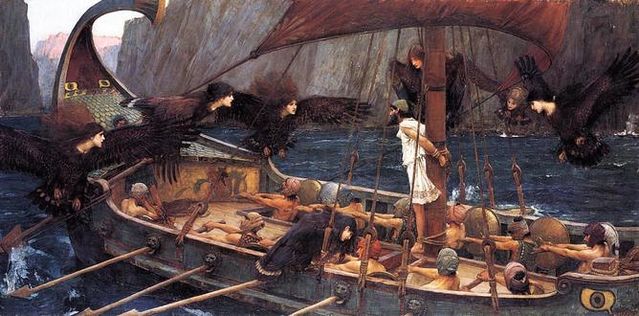It’s a cliché that literature builds empathy. It can help you along in that process, but only if you aggressively work against the impulse to treat literature like a mirror. The first step is to notice that you are doing that. Jessa Crispin on the lessons of Joanna Russ and what a truly liberatory literary world would look like.
↩︎ The BafflerThe idea that an individual is in some special way burdened by the past inevitably leads to the more general reflection: What is a character if not the incarnated accumulation of past behavior and circumstances? No matter what Colm Tóibín says, the flashback is here to stay (in literature). ↩︎ The New York Review of Books
Some men are just reflections of themselves.
What the mirror shows them is all they are.
As the head moves, the unblinking eye delves
Into itself with an unthinking stare.
I knew a man bent to kiss his image,
Stopping just short, careful not to smudge
The glass or ripple the pool of oil sludge.
He saw the epitome of his Age.
When others dared to look into his glass,
He wasn't, he was -- it was hard to tell.
When they saw him, they saw themselves as well.
One day his image caught fire; flaming gas
Consumed itself and left a dull halo,His semblance struggling to form from below.
What Distinguishes How Humans Think

How is it that human thought is so deeply different from that of other animals, even though our brains can be quite similar? The difference is due, Andy Clark believes, to our heightened ability to incorporate props and tools into our thinking, to use them to think thoughts we could never have otherwise. If we do not see this, he writes, it is only because we are in the grip of a prejudice—“that whatever matters about my mind must depend solely on what goes on inside my own biological skin-bag, inside the ancient fortress of skin and skull.” … Read More
Pew: “…a sizable minority of Polish adults take the opposite position. Almost one-in-five Poles (18%) say they would not be willing to accept Jews as citizens of their country, and a similar share (20%) say they would not want Jewish neighbors. Nearly a third of Polish adults (30%) say they would not accept a Jewish person as a member of their family. Polish views are more negative when it comes to two other minority groups in Europe: Muslims and Roma (sometimes called Romani or Gypsies, a term some consider pejorative
Aspiring Malthusian Cold Riverists should note that Sebald remains the genre’s sole practitioner
"How often, I thought to myself, had I lain thus in a hotel room, in Vienna or Frankfurt or Brussels, with my hands clasped under my head, listening not to stillness, as in Venice, but to the roar of traffic, with a mounting sense of panic"
In other words, unlike Lenz, Sebald’s academics don’t seem genuinely crazy, so why do they act as if they are?
"How often, I thought to myself, had I lain thus in a hotel room, in Vienna or Frankfurt or Brussels, with my hands clasped under my head, listening not to stillness, as in Venice, but to the roar of traffic, with a mounting sense of panic"
In other words, unlike Lenz, Sebald’s academics don’t seem genuinely crazy, so why do they act as if they are?
In 1798, an unknown curate named Robert Thomas Malthus published the essay that would give his name to a new breed of anxiety. He argued that the growth rate of the population would always exceed the growth rate of the food supply, inevitably reducing every country to the brink of starvation, and turning the world into a Hieronymus Bosch painting: crowded, chaotic and cruel.
It was a unique, and uniquely grim, theory. For centuries, apocalyptic scenarios had been the sole purview of God, the price he would exact in exchange for sorting out our souls. Malthus demonstrated that not only did humanity possess the divine’s capacity for destruction, but also that the engine of this destruction could be as innocent an act as procreation. Friedrich Engels, joining a chorus of criticism, called it “the most barbarous theory that ever existed, a system of despair which struck down all those beautiful phrases about love thy neighbour and world citizenship.”
A group of nine men out on the drink on Good Friday are being slammed for painting themselves black and carrying a pale mannequin... A new shire Of red necks is born

Private Sydney: Move over Darth Vader, Ibrahim feels the force
Notorious Sydney family the Ibrahims are on the precipice of global fame, with a major international television production currently in top-level negotiations with broadcasters around the world for a new series based on this town's most controversial clan. Replay ...
My Bathroom Mirror Is Smarter Than Yours
Nu Jark: In 42nd and Vanderbilt, a photographer spends years shooting the same New Yorkers over and over again.↩︎ Peter Funch

Like Mediadragonphobia, Nomophobia- fear of being without your smartphone- affects 40% of the population...
Australia Ball-Tampering Not as Disparaging as the Culture That Allowed It The Wire. Front page news in places that take their cricket seriously
|
|

Source: John William Waterhouse’s ‘Ulysses and the Sirens’ (1891). Wikimedia Commons
|
|



